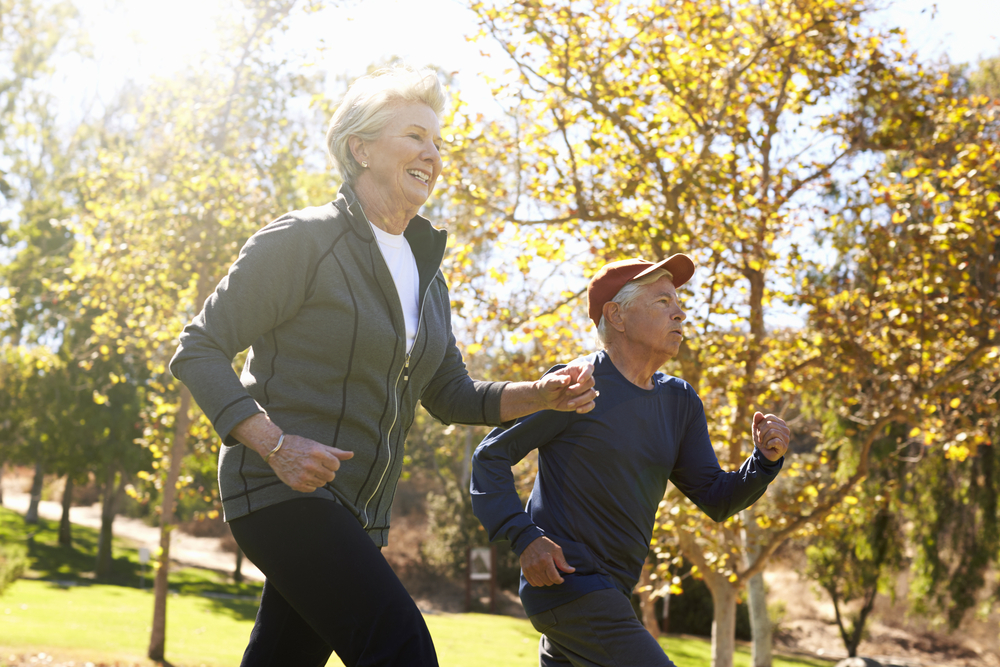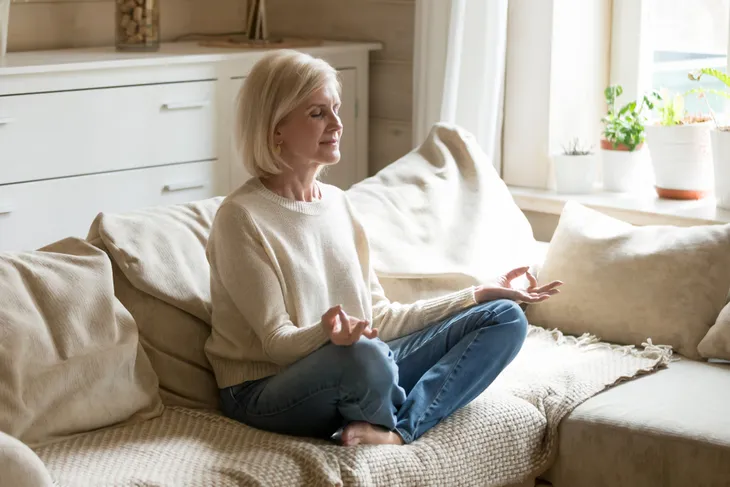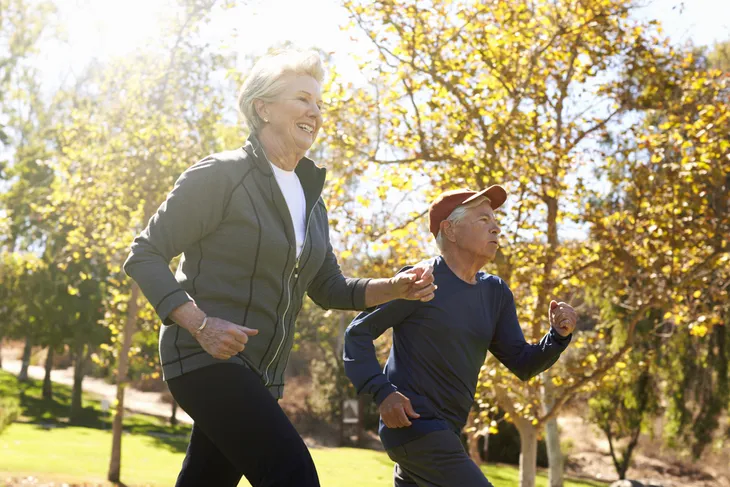There’s an endless supply of ads that focus on age-defying products to make you look younger and claim to reverse many of the harm natural aging has had on your body, especially in the case of your skin. Whether or not these products actually do as they claim is the question. If your goal is living a longer, healthier, more youthful life the key is changing your lifestyle to one that focuses on self-care and longevity.
If looking younger and living longer was as easy as popping supplements or applying certain beauty products, everyone would live into their 90’s, but that isn’t the reality. Defying age naturally and with health in mind takes time and requires commitment, yet much of what you can do to live a healthy more youth-focused life is relatively easy.
Instead of covering up your age, embrace these 10 age-defying techniques that turn back the clock using simple lifestyle changes…
Eat Well
There are a lot of diseases that we just can’t control or prevent, but on the flip side, certain healthy lifestyle changes (i.e., eating well) can really do wonders for your inner and outer health. For instance, a healthy, balanced diet can boost your immune system, give you a better chance at fighting infections and diseases, and even reduce the chances of developing medical problems later in life. That said, maintaining a healthy diet most of the time and indulging in desserts, a glass of wine, or other “unhealthy” foods in moderation is still believed to reduce stress and encourage longevity by many health experts.
Eat a delicious but healthy variety of foods—including lean meats, high-nutrient fish, healthy whole grains, fruits, and vegetables. Healthy food doesn’t need to be bland and you don’t have to cut out major food groups to eat well. Plus, many healthy foods contain high amounts of antioxidants, vitamins, minerals, fiber, and protein, all key components to a healthy diet. Recent research continues to show connections between the healthy compounds in fruits and vegetables and age-defying benefits that give you internal and external results. For instance, many foods high in antioxidants and lean proteins encourage healthy skin and shiny hair, as well as a strong immune system.
Wear Sunscreen
There’s a reason why parents protect their kids by layering on the sunscreen. The sun’s UV rays are extremely damaging and harmful to your skin. In addition, too much exposure has been linked to developing skin cancer. For a while it was thought that just one type of UV ray (UVBs or short wave) from the sun were the most harmful, but more research from the American Cancer Society is now suggesting that UVA rays (or long wave) can do damage as well. As a result, there have been more and more sunscreen or sunblock products developed to protect you from both types of UV rays.
Any type of cancer can be dangerous and life-threatening, and therefore has the potential to limit your lifespan. On top of this, your skin will become noticeably damaged if frequently exposed to the sun without proper protection. You might picture an orange, wrinkly, Floridian when you think of someone who’s been out in the sun too much. While not everyone will experience that level of skin damage without using sunscreen or covering their skin when outside, the sun can cause brown spots and a sort of mottled complexion.
Exercise Regularly
Exercising regularly is still one of the best ways to be healthy, happy, and live a longer life. No, this isn’t a broken record on a loop. The American Heart and Stroke Foundation claims it’s vital to your overall health to make sure you get regular physical activity. The proof is in the proverbial pudding—you will see the many benefits of regular exercise. Regular physical fitness not only decreases the risk of mild to severe diseases, from obesity and diabetes to cancer and cardiovascular disease. A study from the National Cancer Society, as part of the National Institutes of Health, found that regular leisure time (that’s a mere 2.5 hours of moderate exercise or 1.25 hours of vigorous exercise per week for 18- to 64-year-olds) extends life by approximately 4.5 years.
Before letting one of the many standard excuses (i.e., the cost of gym memberships or lack of time in your schedule) get in the way of regular exercise, start with a set small goals and work your way up to exercising multiple times week. It’s definitely an adjustment if you don’t already exercise or have trouble sticking to a plan, but it’s important to remember that exercising daily is doable and the benefits can be life-changing, and even essential to your happiness and well-being.
Volunteer
It might not be obvious to those who have never volunteered, but giving your time to a good cause, something you truly believe in, can positively impact your length and quality of life. So far there’s a lot of focus on doing things that affect you physically, and lifestyle changes that are geared towards this aspect of your health are often obvious. But your mental and emotional health are just as important as your physical well-being, and volunteering is an effective way to improve your emotional health and happiness.
A study conducted by the University of Exeter Medical School in England and published in the journal BMC Public Health, shows us that volunteering can reduce depression, improve social life (and happiness), and significantly increase self-confidence—all of which improve overall health. Depression, anxiety, general malaise, and negative stresses and situations that affect mental health surround us daily. Yet improving your self-esteem and practicing exercises in gratitude and volunteering can turn back the clock and help you live a healthier, more fulfilled life.
Try Relaxation Techniques
According to a 2014 study published in the medical journal, Psychoneuroendocrinology, meditation, yoga, and other relaxation and deep breathing exercises can greatly reduce stress, clear the mind, improve happiness and creativity, and promote focus, decision-making, and productivity. No one can argue that we live in a busy, stimulating world. Factors such as technology, societal pressures, and the cost of living mount dangerous levels of pressure on our already stressful lives. Eventually, these anxieties will catch up to you and begin to affect your health.
Relaxation techniques are designed to clear your mind, establish focus, and teach you to tune out external stress. There’s a variety of meditation, breathing, and yoga techniques available, but the underlying goal is the same. By committing to just 5- or 10-minutes a day of meditation or breathing-focused yoga, you can reap the short and long-term benefits. Improving your current quality of life will extend into a longer, healthier existence all around.
Create Intimacy
Countless studies have shown a direct correlation between intimacy and longevity. In fact, one research study from Queens University, in Belfast, monitored the intimate lives of a group of 1,000 middle-aged men over a decade. The study reported that men who enjoyed lives rich with intimacy (sex and orgasm) doubled their life expectancy versus men who had low levels of intimacy.
Findings from the study, published in the British Medical Journal, link many physical and emotional benefits to greater levels of intimacy. For instance, sex demands a certain level of physical ability and cardiovascular exercise. Also, individuals with better sex lives often sleep better, have less stress, report better self-esteem, and general life happiness and satisfaction.
Sit Less and Move Around More
Desk jobs are nothing new, but more and more research has shown the harmful effects of sitting all day long. The lack of exercise from sitting 8-hours each day can slow metabolism and cause a negative ripple effect on important areas of your health. In fact, a study from the American College of Cardiology links excessive sitting to obesity, coronary artery calcification and increases the risk of heart disease by 14-percent. By getting up and moving around as often as possible, you can protect your heart and improve your health for the better.
There are many ways to incorporate more movement into your day, many of which employers are steadily embracing. Numerous offices compete in walking challenges, where you track and record your steps using a pedometer. Knowing that the National Institutes of Health recommend walking 10,000 steps a day, it’s a huge wake-up call when your steps only total 2,000. There’s also walking meetings, standing desks are becoming more prevalent, and getting up to physically visit a coworker’s office instead of emailing them will get you out of your seat for a few steps.
Stop Smoking
Not everyone smokes and the number of smokers in the U.S. has decreased more than 20-percent since 1965. However, roughly 20-percent of U.S. adults still smoke. That’s a large group of people opting into a poor lifestyle choice that’s linked to several life-limiting diseases—including cancer of the lungs, throat, larynx, kidney, stomach, and pancreas. Although lung cancer and many of the more obvious organs are known smoker’s risks, lighting up actually has harmful effects on your whole body, according to research from the U.S. Centers for Disease Control (CDC).
For instance, the CDC claims that smoking increases the risk of coronary heart disease and stroke by 2 to 4 times. Plus, if you smoke your chances of developing lung cancer increase by roughly 25 times. With 1 in 5 deaths linked to smoking, making the choice to butt out is a definite and positive age-defying choice for anyone with the bad habit.
Have an Active Social Life
Happiness and regular social interaction with a network of friends can be the perfect way to increase emotional fulfillment and turn back the clock on aging if you put some effort into it. According to the Mayo Clinic, solid friendships can reduce stress, increase happiness, improve self-confidence. and help you make positive life choices (while avoiding bad habits). Friends challenge you and give you strength, but maintaining connections also requires maintenance. Families and jobs take up a lot of time, so you have to put forth the effort to make sure you to improve your health and well-being through friendships.
Not only do social connections fulfill us in ways that material objects can’t, the support that comes from people close to you can affect how well you deal with hard situations and also how you navigate curve balls (or obstacles) that life inevitably throws your way. It’s easy to fall back into a depression or period of social isolation if you don’t have people around your to give you strength and support during times of need. Take advantage of the potential years added to your life by maintaining a healthy, active social life.
Sleep Well
We’re reminded constantly about the importance of quality sleep, yet remedying poor sleeping habits never becomes a priority. Several factors contribute to a good night’s sleep—duration of sleep, sleeping straight through the night without interruption, the length it takes to fall asleep, dreams, and the REM (rapid eye movement or deep sleep) cycle. However, you still might not be convinced about the necessity of sleeping well and getting enough sleep. Consider research from a group of psychiatrists at the University of California, in San Diego, which states that people who don’t get at least 6.5- or 7-hours of sleep each night live shorter lives.
The study, published in the Archives of General Psychiatry, monitored the sleeping habits of 1.1-million Americans over a 6-year period, and found that individuals who slept 6.5- to 7.4-hours had a lower mortality rate than those with shorter or longer sleep periods. Findings also showed that skimping on a full night’s sleep, even by 20 minutes, impaired cognitive performance and memory the following day.













